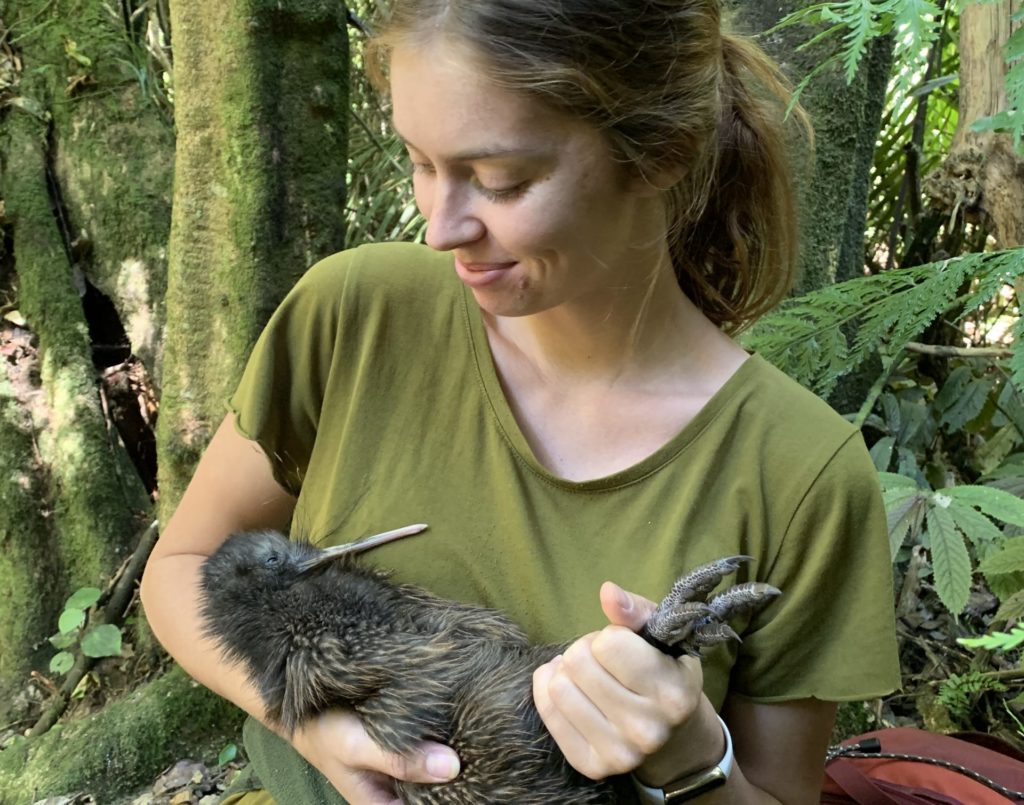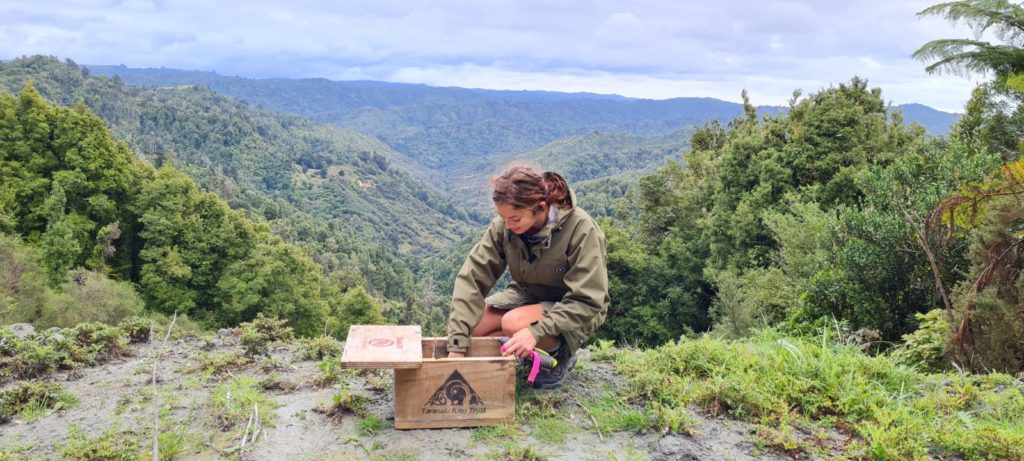Like many of us, Māia Gibbs grew up never having seen a kiwi in the wild. Now, she gets up close and personal while helping save the kiwi as a Predator Free NZ Trust apprentice.

Holding a fluffy, pear-shaped ball of feathers with strong talons Māia, 21, is living the dream of many in a country that idolises kiwi.

Though a revered national icon, kiwi are rarely seen in the wild. For one thing, kiwi are nocturnal and masters of camouflage. Another is their increasing scarcity.
As an apprentice kiwi habitat protection ranger for Taranaki Kiwi Trust (TKT), Māia is working to reverse the decline of North Island brown kiwi through predator control. She’s also training to become an accredited kiwi handler.
“They’re big, weird birds. Holding them, you get an idea of their personalities. Some are feisty, some are cuddly and calm,” Māia says.
Māia practices for her accreditation by cradling kiwi during health checks or fitting transmitters. One hand firmly holds their sharp-clawed dinosaur-like feet while the other arm gently supports their fragile bodies, always looking for signs of stress.
“You can’t just hold a kiwi any old way. They are vulnerable to crushing injuries. Without a sternum [breastbone], they’re very fragile but with strong legs,” Māia says.
Much like their sternum, the conservation status of kiwi is delicate.
After years in decline, brown kiwi were this year bumped to the covetous conservation status of ‘not threatened’ with a critical caveat: ongoing conservation intervention. Without continuing help from people like Māia and groups like Taranaki Kiwi Trust, the species will likely be extinct in the wild within two generations.

From rare to everywhere
A farm girl growing up on her whānau land in North Taranaki, Māia would hear the high-pitched, piercing cry of male kiwi and the responding guttural croak of female kiwi.
After an OE beekeeping and a brief stint in hospitality, Māia responded to the call of the kiwi and turned her attention to protecting them at home in Taranaki. A keen outdoorswoman, she’s more comfortable in the forests and hills getting her hands dirty than slinging drinks.
“Trekking around the hills, keeping fit and healthy and looking after the environment . . . it just doesn’t feel like work,” Māia says.
After a year on the job, Māia is immersed in the TKT mission to turn kiwi from ‘rare to everywhere’.
She’s got stuck into kiwi tracking and translocations – TKT has released 125 kiwi onto Taranaki Maunga and the Kaitake ranges. Visit their site to meet some of the monitored kiwi released into the wild.
She’s laid and cleared countless traplines, catching feral cats, ferrets and stoats.
“Mustelids directly target kiwi. Every trap I clear, I think about how many birds will be saved. My favourite part of the role is listening to all the birds that have come back to an area after a few years of predator control.”
She’s recently passed a Level 3 NZ Certificate in Pest Operations and completed a variety of courses. When we caught up with her, she had just finished a chainsaw module, will soon be learning the art of 5-minute bird counts and was planning for an exciting upcoming work exchange with other apprentices on Aotea Great Barrier Island.
Taking the next step

Māia set the goal of doing two million steps in a fundraising campaign to help TKT save kiwi. Starting in Save the Kiwi Week last year, Māia has been marching through the year and smashed her step goal a month early.
With a year to go in her apprentice programme, Māia is thinking about her next steps.
“I’ll be taking every and any opportunity I can. I’ve already learnt heaps through the apprenticeship programme with all the training and courses we do,” she says.
TKT manager Celine Filbee says she’s thrilled with the partnership with Predator Free NZ Trust enabling them to employ Māia.
“The inclusion of a third staff member on our trapping team has given the project some significant impetus.
“Māia has proven to be a real asset, she has a thirst for learning, her values align well with our kaupapa and she is eager and prepared to give anything a crack. Rangatahi like Māia and her apprentice peers are the future of conservation in NZ, and we are privileged to have the opportunity to nurture her.”
Māia says she’ll be well set up for all kinds of opportunities when she graduates in a year, but one thing is set in stone… caring for kiwi is truly her calling.

